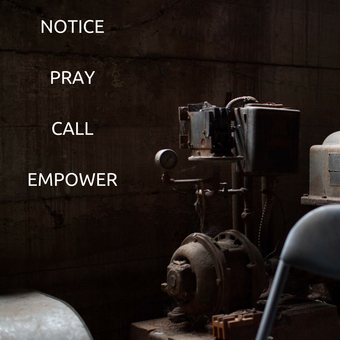 As we launch into green season today, we also launch into an extended presentation of the ministry of Jesus: his preaching, his healing, the ways he interacted with people, the stories he told. But before we really get going together on this new phase of the church year, let’s just note that it’s a quite different kind of season than where we’ve been so far. The Lent-Triduum-Easter cycle, as well as the Advent-Christmas cycle, which have dominated the year for us so far, are powerful and clear seasons that are meant to have powerful and clear results in us. During those seasons, we re-encounter the key landmarks in what Christians see as the central narrative of the universe. Each year those cycles have work to do in us, which is to make God’s saving acts vividly present. And each year we have work to do with them, which is to let everything we are going through this particular year get brought into conversation with God’s saving acts and opened up to them. When both parts of that equation are in play, Christmas and Easter get some purchase right in the middle of our lives and are able to make specific changes in us. They do that incrementally, year by year, some years far more obviously than others; but that’s what can happen, if you’re willing to make the investment, in those powerful cycles we call Advent-Christmas and Lent-Easter. This green season is a bit different. It doesn’t feature dramatic landmarks like God taking on human flesh, or pouring out his lifeblood on the cross for us. The green season presumes all that has happened already. It presumes we’ve already done the purple and white and red seasons; we’ve met Christ among us at Christmas, we’ve put our whole trust in his death and resurrection at Lent and Easter, and we’ve been filled with his Spirit at Pentecost. The green season presumes we’re now ready to live out what God did for us in this year’s big landmark seasons.
0 Comments
Hello everyone, my name is Cameron Barnard. I am a cradle Episcopalian who was raised by the Emmanuel Memorial Episcopal Church family. I would like to share with all of you my story about being an acolyte at Emmanuel and how acolyting and this church have bettered me in a number of ways.
As many of you might already know, I have been an acolyte here for about seven years. I witnessed my older brother Garrett acolyte plenty of times, and he always made it look so easy, so I was excited to learn for myself. At my first ever service as an acolyte, I was given the assignment of carrying the flags in, which unfortunately is no longer a position at the church. On that day, I remember getting nervous because I had no idea what to expect. My first hurdle was figuring out what to wear. For the first few services, I didn’t know which color robes to wear on which days, so I would always wait and see what other acolytes had on and mirror them. Then came the actual acolyting duties. I was glad to find out that first day that really all the flag carrier had to do was to process in with the flag and just sit at the altar all service long and then take the flag back out during the recession hymn. It wasn’t until about a year later that I really had to face my first real challenge as an acolyte. I was given the task of being a server for the first time, which included many more jobs than being a flag carrier. I and another server accepted the responsibility of carrying the torches in, moving the book before the gospel reading, bringing the torches out to the middle of the pews for the gospel reading, setting out and cleaning up the bread and wine for the communion and carrying the torches back out during the recession. While these duties may sound easy now looking back, it was very intimidating for a shy eleven year old like me. My first couple of times were not perfect, but I continued to serve at the altar because I felt a certain responsibility toward my church. Eventually I was assigned to carry the cross and to perform as Master of Ceremonies, MC for short. Both included completely new tasks that I had to learn and master every Sunday, and the latter role also required me to know all the tasks of the other acolytes because, as MC, I was tasked with being their leader. Learning to accept leadership responsibilities through my church service eventually translated well into my leadership roles as a class officer at Central High School and as a swim team captain. There have been many bumps in the road during this long seven-year journey, but freely accepting the duties of an acolyte here at Emmanuel has been the greatest decision I ever made in my life. Acolyting has taught me so many important qualities such as leadership, character, and responsibility just to name a few; in addition, serving at the altar has made me feel closer to God than any other experience at Emmanuel. I believe that Emmanuel has been one of the biggest factors for my success in life so far, and I would just like to thank Deacon Chris, the late Larry Bouton, and all the priests I’ve ever worked with for giving me the opportunity to come many Sundays and learn something new about myself; moreover, I owe each of them a debt of gratitude for their patience with, compassion toward, and care for me. I will forever cherish the help everyone at Emmanuel has given me along the way, and I look forward to taking all that I have learned here and continuing to better myself as both an Episcopalian and a college student in the next chapter of my life.  When the day of Pentecost had come, they were all together in one place… and all of them were filled with the Holy Spirit. If the folks who make up Emmanuel’s participating community were ever all together in this place, we would not be able to fit in the nave. But we never are. Any given Sunday, probably about 40% of us are actually together, and it’s different ones each week. This is less true at the 8:00, which is more stable as a sort of small group within the parish, but across both services, there’s never really a quorum on any one Sunday. I’m not talking the whole church mailing list, I’m talking people who are currently taking part in our life together in some way, but who have not had the experience of being all together in one place the way our first lesson describes. That’s a situation many American churches are facing, and I think we’re right on track with national averages. Having a different group at worship Sunday to Sunday poses a lot of challenges for any church, but one of them is that the kind of unity in spirit and solidarity in mission that took place on the first Pentecost is becoming a rare experience for many Christians in the USA. The entire church at Pentecost was all together in one place, praying and seeking God, and that is when the Holy Spirit fell. Unity of spirit and solidarity of mission, with everyone on board. But it wasn’t just that first feast of Pentecost. It has happened like that throughout the history of the church. There is something about groups of people who are really together that the Holy Spirit seems to find very attractive – if you’ve ever been part of a Christian community that was of one heart and soul, all in the same place, where a quorum was available to be deployed by the Spirit for God’s work, you know what I’m talking about. The Spirit falls on communities of people like that. The Spirit goes to work through communities of people like that. And being part of a community where that is happening is a life-changing experience for anyone who has had it. |
Archives
July 2024
Categories |

 RSS Feed
RSS Feed